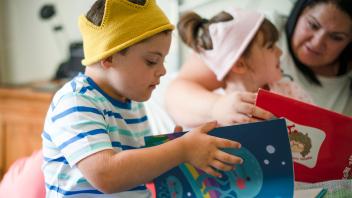A Washington Post columnist recently lamented the impact of the current polarized political climate in the United States. She said it was “contaminating” our children; that its impact was visible in various interactions.
How can adults counter the harsh rhetoric that is so pervasive? It may be as simple as helping our children walk a mile in another’s shoes, helping children develop empathy.
Em•pa•thy: the feeling that you understand and share another person’s experiences and emotions : the ability to share someone else’s feelings. (Merriam-Webster )
Children exhibit empathy early on (maybe even as infants). Empathy continues to develop it as children emulate adult behaviors and as they experience the world. One way to help them grow beyond immediate homes and classrooms is through literature. Books can take readers of all ages out of their communities, beyond their borders, even out of this world.
Books are both windows and mirrors allowing readers to see themselves and others in myriad situations. Grace Lin uses this metaphor quite eloquently in a TED talk:
Resources for parents and teachers to identify these books are increasing. I Am Your Neighbor is one such online resource. And of course, Reading Rockets and our sister site Colorín Colorado always include books by and about different cultures and people.
Let’s stop contaminating our children with toxic language and instead help them build a less contentious world. The ability to empathize, to include rather than exclude, comes from the recognition that people have a great deal in common regardless of what they look like, where they live or how they speak.

